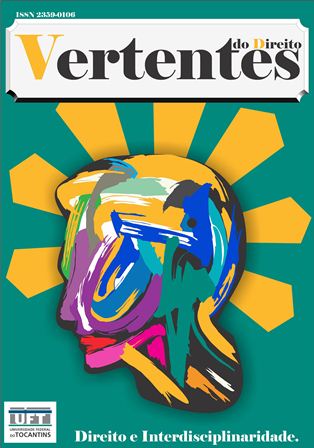ILLEGITIMACY OF THE COMPULSORY DISCOUNT OF THE ASSISTANCE CONTRIBUTION ON THE EMPLOYEE'S REMUNERATION WITHOUT PRIOR AUTHORIZATION: AFFRONT THE CONSTITUTION
DOI:
https://doi.org/10.20873/uft.2359-0106.2021.v8n2.p349-366Keywords:
compulsório, contibuição assistencial, inconstitucionalidade, liverdade de associação, repercussão geralAbstract
The 2017 labor reform was the most expressive change in current labor legislation, causing changes in employment relationships and labor justice. Highlighted the change in the union contribution that became optional, before it was mandatory. Threatening the source of funding / funding for the structure and strengthening of union entities. Awakening a déjà vu, since the assistance contribution, which was also mandatory and that for decades was surrounded by controversies about its legitimacy or illegitimacy, regarding its collection. The fact is that for years on end the assistance contribution was automatically / compulsorily deducted from the workers' wages, regardless of prior authorization, or even, regardless of issuance affiliated to the union, with the support of a convention or collective, which would supposedly comply with the wording of the article 513, item “e”, of the CLT. The misinterpretation of the verb “impose” the aforementioned legal provision caused the compulsory discount of the contribution, an error that remained for decades, and this injustice with workers has only recently been corrected. After residual legal demands, through the judgment of ARE 1018459 in 2017, the right to impose contributions was declared unconstitutional, regardless of union membership, as it does not have a tax nature, thus, the imposition of the assistance contribution to non-members, even which appears in an instrument of collective agreement or convention, violates the principle of freedom of association with the union and also the wage protection system. It is salutary to inform that the decision has been attributed the general repercussion to the theme.
KEYWORDS: Assistential contribution; compulsory; unconstitutionality; freedom of association; general repercussion.
References
ALECRIM, Luis Carlos Rodrigues. Financiamento Sindical e seus Novos Desafios Pósreforma Trabalhista. São Paulo, 2018.
BRANCO, Heitor Kulig. “Contribuições Sindicais” X “Contribuições Assistenciais”: Análise Jurisprudencial e Delimitação De Conceitos. Revista do Curso de Direito da Faculdade de Humanidades e Direito, v. 14, n. 14, 2017.
COELHO, Bernardo Leôncio Moura; ALBUQUERQUE, Edmilson Dias de. Dos limites à contribuição sindical assistencial: novos posicionamentos do STF e do TST. Rev. do Trib. Reg. Trab. 10ª Região, Brasília, v. 21, n. 1, 2017.
_____. Constituição da República Federativa do Brasil de 1988. Brasília, 5 de outubro de 1988. Disponível em: <http://www.planalto.gov.br/ccivil_03/constituicao/constituicao.htm>. Acesso em 03 dez. 2020.
CRASTO, Alexandre Augusto Zaghini; DELBEN, Ana Cleusa; FERREIRA, Paulo Henrique de Campos Lopes. Receita Sindical: Impactos da reforma trabalhista. Revista TST, São Paulo, vol. 85, nº 1, jan/mar 2019.
_____. Decreto-Lei nº 5.452, de 1º de maio de 1943. Aprova a Consolidação das Leis do Trabalho. Disponível em: <http://www.planalto.gov.br/ccivil_03/decreto-lei/del5452.htm>. Acesso em: 28 fev. 2021.
DIAS, Antônio Carlos. A história das organizações sindicais. 2004. Disponível em: <http://www.arcos.org.br/artigos/a-historia-das-organizacoes-sindicais/>. Acessado em: 02 dez. 2020.
_____. Lei nº 13.467, de 13 de julho de 2017. Altera a Consolidação das Leis do Trabalho (CLT). Disponível em: <http://www.planalto.gov.br/ccivil_03/_ato2015-2018/2017/lei/l13467.htm>. Acesso em: 28 fev. 2021.
MELO, Raimundo Simão de. A Contribuição Assistencial Sindical sob a Nova Ótica do Ministério Público do Trabalho e do Judiciário. JusLaboris, 1995. Disponível em: <https://juslaboris.tst.jus.br/bitstream/handle/20.500.12178/111916/1995_melo_raimundo_contribuicao_assistencial.pdf?sequence=1&isAllowed=y>. Acesso em: 28 fev. 2021.
NETO, Alberto Emiliano de Oliveira; SANTOS, Enoque Ribeiro dos. Reforma Trabalhista e Financiamento Sindical. Contribuição Assistencial/Negocial dos Não-Filiados. JusLaboris, 2018. Disponível em: <https://juslaboris.tst.jus.br/bitstream/handle/20.500.12178/152271/2019_oliveira_neto_alberto_reforma_trabalhista.pdf?sequence=1&isAllowed=y>. Acesso em: 28 fev. 2021.
STÜRMER, Gilberto, André Luiz. Contribuições Sindicais. Enciclopédia Jurídica da PUCSP, Direito do Trabalho e Processo do Trabalho. São Paulo, 2020.
_____. Supremo Tribunal Federal. ARE: 1018459 PR – PARANÁ. Relator: Min. GILMAR MENDES, Data de Julgamento: 23/02/2017, Tribunal Pleno - meio eletrônico, Data de Publicação: DJe-046 10-03-2017. Disponível em: < https://redir.stf.jus.br/paginadorpub/paginador.jsp?docTP=TP&docID=12540767>. Acesso em: 02 dez. 2020.
_____. Supremo Tribunal Federal. Súmula Vinculante 40. A Súmula Vinculante 40 resultou da conversão da Súmula 666. DJE de 20-3-2015. Disponível em: http://www.stf.jus.br/portal/jurisprudencia/menuSumario.asp?sumula=2204>. Acesso em: 02 dez. 2020.
_____. Tribunal Superior do Trabalho. Precedente 119 Contribuições Sindicais - Inobservância de Preceitos Constitucionais – (mantido) - DEJT divulgado em 25.08.2014. Disponível em: <https://www3.tst.jus.br/jurisprudencia/PN_com_indice/PN_completo.html#Tema_PN119>. Acesso em: 28 fev. 2021.
Downloads
Published
How to Cite
Issue
Section
License
Os trabalhos aprovados para publicação tornar-se-ão propriedade da Revista sem qualquer ônus para a mesma. A Equipe Editorial se reserva o direito de promover as adequações necessárias para publicação.
O conteúdo dos trabalhos publicados na Revista Jurídica eletrônica Vertentes do Direito - inclusive quanto à sua veracidade, exatidão e atualização das informações e métodos de pesquisa - é de responsabilidade exclusiva dos autores. As opiniões e conclusões expressas não representam posições da Revista nem da Universidade Federal do Tocantins.
















